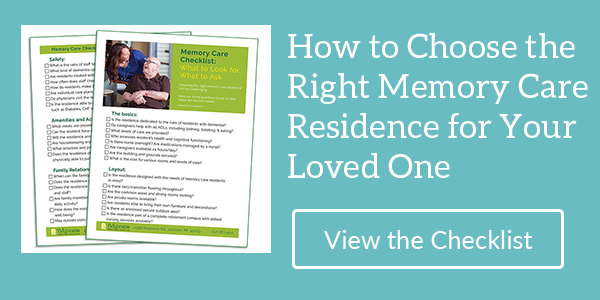Navigating memory care is difficult when a loved one is diagnosed with dementia or Alzheimer’s disease, families are often at a loss for ways to manage and move forward. Many first choose to care for a senior at home. Still, the progression of symptoms and behaviors can eventually make a move to memory care the best option for everyone concerned. Making the decision and transition, however, can be fraught with challenges, even in the best-case scenario. When a move to memory care is on the table consider these strategies to help families and seniors cope.
5 Strategies for Navigating Memory Care
Making the decision
The first and often most difficult step is the decision and families should work together to reach a consensus. The best way to do this is to hold a family meeting, discuss the reasons for the move (e.g., caregiver burnout, behavioral problems, wandering, etc.), dispel misconceptions, and begin to understand all that professional memory care has to offer.
For example, in our blog, “Six Ways Memory Care Improves Residents’ Quality of Life,” we look at several essential ways memory care can improve life, from personal comfort to safety and behavior management. These factors are in addition to the benefits of excellent nutrition, socialization, activities and therapies designed to slow progression and improve overall wellbeing.
Choosing the best memory care community
The next step is to choose a memory care community that meets or exceeds expectations for the following:
- Staff who are on-site 24/7/365 and specially trained in dementia care.
- A high staff-to-patient ratio.
- Staff who want to know all about a loved one including their past.
- A clean, modern, and well-maintained environment, indoors and outdoors.
- Daily care that is available as needed including help with personal hygiene, dressing, eating, mobility, incontinence, and medication management.
- Optimum safety and security measures in place.
- Excellent meals that can be tailored to a resident’s dietary and physical needs.
- Daily activities to enhance memory and help minimize negative symptoms and behaviors.
Learn more about what to expect from top memory care communities in our blog, “What the Best Michigan Memory Care Residences Have to Offer.”
Easing the transition to memory care
Another hurdle is the actual transition from living at home to living in memory care. Although it may seem like a good idea to begin to prepare a loved one far in advance of the move, according to the alz.org document, “Seven Tips for a Successful Move to Dementia Care,” it’s best to wait until close to the date to help minimize anxiety. It’s also a good idea to work with a loved one’s physician who can adjust or prescribe medication that can reduce feelings of anxiety and fear before the move and then wean them from it afterward.
When deciding what personal belongings to move, keep in mind that the more familiar a new apartment appears, the better for a smooth transition. On moving day it can be helpful to have the senior occupied elsewhere so family members can move in and arrange everything to be comfortable and to look and feel as much like home as possible.
Staying connected
Many communities advise against visits for the first week, which while good for the senior can be difficult for caregivers. But after that initiation period, families can help by staying connected with community staff and their loved ones. For starters, try to stick to consistent visits on the same day and hour and call often to let loved ones know they are not forgotten. The best memory care communities also welcome family participation in special events and activities and make it easy for them to share meals.
Also be aware that because memory loss is progressive, no longer seeing a loved one every day can mean changes in their condition may be surprising. To continue to maintain connections and communicate well, follow the recommendations in the nia.nih.gov article “Do’s and Don’ts: Communicating With a Person Who Has Alzheimer’s Disease.”
Managing emotions
For families and especially caregivers, the move to memory care can bring feelings of guilt, loss, sadness, and failure. These are normal and when they occur, it’s time to get help. For an in-depth look at tips, recommendations, and resources check out the alz.org document “Guilt and Grief When Moving Your Loved One to a Care Facility.”
A move to memory care may be the best move a family can make to ensure the health, safety, and security of a loved one. For more information about Countryside, please call Margaret Nagel at (517) 206-5000 or download our brochure to learn about our care levels, cost, and amenities.


